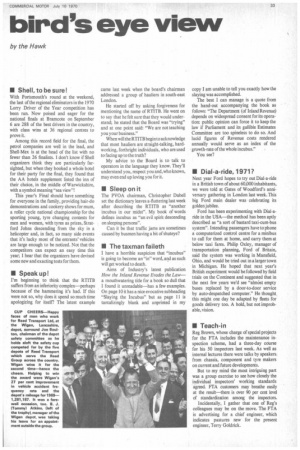birds eye view
Page 35

If you've noticed an error in this article please click here to report it so we can fix it.
by the Hawk • Shell, to be sure!
With Portsmouth's round at the weekend, the last of the regional eliminators in the 1970 Lorry Driver of the Year competition has been run. Now poised and eager for the national finals at Brameote on September 6 are 288 of the best drivers in the country, with class wins at 36 regional centres to prove it.
Among this record field for the final, the petrol companies are well in the lead, and Shell-Mex is at the head of the list with no fewer than 26 finalists. I don't know if Shell organizers think they are particularly farsighted, but when they booked a whole hotel for their party for the final, they found that the AA hotels supplement listed the inn of their choice, in the middle of Warwickshire, with a symbol meaning "sea view"!
This year's Final should have something for everyone in the family, providing hair-do demonstrations and cookery shows for mum, a roller cycle national championship for the sporting young, tyre changing contests for men and women, with tyres as prizes, Stratford Johns descending from the sky in a helicopter and, in fact, so many side events that it's lucky most of the entrants' vehicles are large enough to be noticed. Not that the competitors can expect an easy time this year, I hear that the organizers have devised some new and exacting tests for them.
• Speak up!
I'm beginning to think that the RTITB suffers from an inferiority complex—perhaps because of the hammering it's had. If this were not so, why does it spend so much time apologizing for itself? The latest example came last week when the board's chairman addressed a group of hauliers in south-east London.
He started off by asking forgiveness for mentioning the name of RTITB. He went on to say that he felt sure that they would understand; he stated that the Board was "trying" and at one point said: "We are not teaching you your business."
When will the RTITB begin to acknowledge that most hauliers are straight-talking, hardworking, forthright individuals, who are used to facing up to the truth?
My advice to the Board is to talk to operators in the language they know. They'll understand you, respect you and, who knows, may even end up loving you for it.
• Sleep on it
The PVOA chairman, Christopher Dabell set the dictionary leaves a-fluttering last week after describing the RTITB as "another incubus in our midst". My book of words defines incubus as "an evil spirit descending on sleeping persons".
Can it be that traffic jams are sometimes caused by busmen having a bit of shuteye?
• The taxman faileth
I have a horrible suspicion that "incubus" is going to become an "in" word, and as such will get worked to death.
Aims of Industry's latest publication Haw the Inland Revenue Evades the Law— a mouthwatering title for a book so dull that I found it unreadable—has a few examples. On page 10 it has a nice evocative subheading "Slaying the Incubus" but as page 11 is tantalizingly blank and unprinted in my copy I am unable to tell you exactly how the slaying was accomplished.
The best I can manage is a quote from the hand-out accompanying the book as follows: "The Department (of Inland Revenue) depends on widespread consent for its operation: public opinion can force it to keep the law if Parliament and its gullible Estimates Committee are too spineless to do so. And lucid figures of Revenue costs rendered annually would serve as an index of the growth-rate of the whole incubus."
You see?
• Dial-a-ride, 1971?
Next year Ford hopes to try out Dial-a-ride in a British town of about 60,000 inhabitants, we were told at Gates of Woodford's anniversary gathering in London last week. This big Ford main dealer was celebrating its golden jubilee.
Ford has been experimenting with Dial-aride in the USA—the method has been aptly described as "a sort of bastard taxi-cum-bus system". Intending passengers have to phone a computerized control centre for a minibus to call for them at home, and carry them at below taxi fares. Philip Oxley, manager of transportation planning, Ford of Britain, said the system was working in Mansfield, Ohio, and would be tried out in a larger town in Michigan. He hoped that next year's British experiment would be followed by field trials on the Continent and suggested that in the next few years we'd see "almost empty buses replaced by a door-to-door service by auto-despatched computer." He thought. this might one day be adapted by fleets for goods delivery too. A bold, but not improbable, vision.
• Teach-in
Reg Brown, whose charge of special projects for the FTA includes the maintenance inspection scheme, had a three-day course for his 50 inspectors last week. As well as internal lectures there were talks by speakers: from chassis, component and tyre makers on current and future developments.
But to my mind the most intriguing part was a group exercise to see how closely the individual inspectors' working standards agreed. FTA customers may breathe easily at the result—there is over 90 per cent level of standardization among the inspectors.
Incidentally, I gather that one of Regis colleagues may be on the move. The FTA is advertising for a chief engineer, which indicates pastures new for the present engineer, Terry Goldrick.












































































































